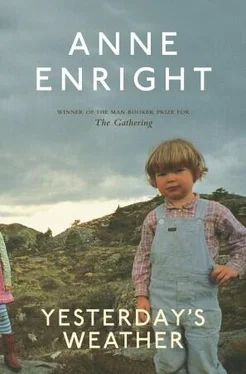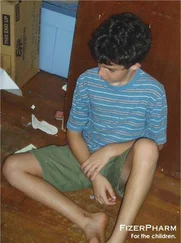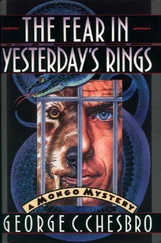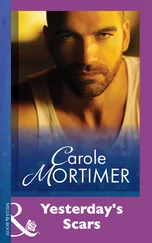So when he came out of hospital six months later his room was still there — of course it was. No one was going to let Fintan down. Our other housemate (and my ex), Pat, was setting something up in Germany and was always there and gone again. I had a job. Over the years, the area started to come up. And then it was just Fintan and me.
Now it was just me, crying on the way back from the bus stop, pulled by the sound of his playing along a terrace of pebbledash, painted blue and grey and dark green. The woman we called Bubbles was listening at her front door in a peach-coloured housecoat-negligee. She saw me blowing my nose and I gave her a laugh and waved her away. I didn’t know what I was crying for. For the music. For the guy I used to know at college, maybe, with his boy’s body and his jumper of royal blue. And the fact, I think, that his were the first hands I ever loved, the whiteness of them.
The playing stopped as I put my key in the door. When I got into the living room he was sitting on the sofa, as though he had never left it. I pulled him into an awkward, easy embrace and we sat like that; Fintan twisted into me, his face pressed against my chest until my T-shirt was wet from the looseness of his mouth. We sat for a long time. We made that picture of ourselves. That pietà. When I closed my eyes, I could see us sitting there — though I could not, for some reason, feel him in my arms.
In the kitchen, drinking tea — the phone started to ring and I went out to answer it. Then I came back and sat down.
‘I used to be clever, Fintan,’ I said. ‘But it is no use to me any more.’
‘I know,’ he said.
I should have given him his pills then. I should have forced one into his hand, into his mouth, or down his throat — but we were always too delicate with each other, even for words, so we just said goodnight and went to bed.
On Christmas Day, my mother announced that plum pudding was too much trouble any more, and produced one of those shop-bought ice-cream desserts. My brother had brought a few good bottles of wine, and I supplied the paper hats. After the pudding declaration, we had a huge fight about brandy butter and I burst into tears. My mother just looked at me.
On New Year’s Eve, I rang the house, but there was no answer. And when I got home on the third of January, Fintan was gone.
On the fourteenth of February I got my Valentine’s card and twelve fat, dark roses delivered to my desk at work. I also got a phone call from Fintan’s occasional brother in Castle-knock to say that they had found him, finally, that they knew where he was.
I took the afternoon off and bought a Discman and some CDs, then took a taxi out to Grangegorman. I had never been there before: it was a joke of an asylum, looming and Victorian, people muttering and whining in the bare wards, and a smell everywhere of bleach and sperm that was like your own madness, not theirs. When I found him, Fintan was lying so still in the bed that you could see every bump and crevice, from the knuckles of his fingers to the high, tender line of his penis, under the thin white counterpane. He opened his eyes and closed them again. Then he opened them and looked at me for a while and turned his head away. Drugged up to the eyeballs.
I clipped the headphones into his ears and put some music into the Discman. He twitched, and I turned the volume down. Then he turned to look at me, as the music played. He took my hand and placed it against his face, over his mouth and nose, and he kissed my palm. He looked at me with great love. I don’t know what his eyes said as they gazed at me, over my lightly gagging hand. I don’t know what they saw. They saw something lovely, something truly lovely. But I am not sure that they saw me.
The wedding was in November, by which time Fintan was back in the world again, slightly depleted. Every time this happened, I thought, he would become more vague; harder to see. I felt many things — guilt mostly — but the health worker wanted to put him in a halfway hostel, and besides, I was leaving. Whatever way you looked at it, the house was finished for us now. There would be no more snapping ashtrays and trips to the launderette; there would be no more evenings on the bust-up sofa, or chats with Bubbles on the Captains Road.
But I never once thought of saying goodbye to him. I was only getting married. I even brought him along on the hen night — as a sort of mascot, I suppose.
The evening started off slow. My grown-up girlfriends were talking contact numbers and exchanging business cards — I had to start the tequila slammers myself. Two hours later we were off on the Final Bash, the last night ever. I have some recollection of a couple of horse-drawn cabs. I also remember climbing in over the back wall of my new — that is to say, my future — husband’s house. It did not occur to us — to any of us — to use my key, or even knock at the front door. There was a light on in the kitchen: I remember that. We stripped a red-brick wall of ivy and wore it in our hair. I lost my knickers to some ritual in the flower beds. My oldest friend Cara took pictures, so this is how I know all this — two of the girls trying to get my shirt off, Breda ripping up the dahlias (saying, apparently, ‘Boring flowers. Boring flowers.’) and someone, it looks like Jackie, snogging Fintan up against a tree. In the photo, he is all throat. His head is bent back for the kiss, so the flash catches his Adam’s apple and the blue-white underskin of his neck.
I kissed him myself once. It was in my second year at college, before he went mad, or whatever. We sat on the win-dowsill at a party and pulled the curtains around us and talked for a while, with our heads tipped against the cold window-pane. I remember the silence outside, the curtains resting against us, and beyond them the fug and blather of the room. At some stage, I kissed him. And that was all. The skin of his mouth was terribly thin. Even then, Fintan dealt in moments. As though he moved through liquid while the rest of us made do with air.
So, I am married, whatever that means. I think it means that now I know.
Now I am living in that house with its boring flowers and ivy-covered walls, I know that I didn’t ‘nearly’ love Fintan — I loved him, full stop. And there is nothing I can do about it — about the fact that I loved him for years and did not know it. Nothing at all.
I sleep easy enough beside my husband, my greedy old man. Because he was right in a way — Fintan is always right, in a way. So many of the men that you meet are dead. Some of them are dead in a nice sort of way, some of them are just dead. It makes them easy to seduce. It makes them dangerous to seduce. They give you their white blindness.
So it is easy, under the sheets, to lie beside him and think about nothing much. My hairy old baby. Who would do anything for me. He spends money on me, it seems to give him pleasure — more pleasure than what he is buying at the day’s end, because dead men don’t know the difference between things that are alive (me, for example, or even My Cunt) and things that are dead, namely His Money, which is just so many dried-out turds and not worth living in the house of the dead for. And so I keep talking and he keeps dying, and giving me things that have already decayed (a ‘lovely’ silk scarf, a car that I might want to drive some place, two books that are quite like real books I might want to read). There is the conspiracy of the dead all around us and the head waiters still smirk, as head waiters do, while the food fucks on the tabletop in an encouraging sort of way.
I am sick now. This life does not suit me. His old wife has cyst problems, something horrible with her back, some disintegration. I hear her silence on the other end of the phone. I see the cheque-book with her name in it, printed under his. I am thinner now. My clothes are more expensive. Weekends he sees his daughters — always a little bit better at their maths, their smiles always sweeter, their ribbons that little bit straighter; their cheekbones beginning to break through the skin of their faces now, too early, beautiful and aghast.
Читать дальше












